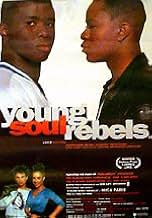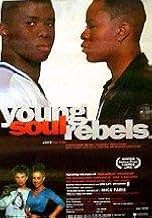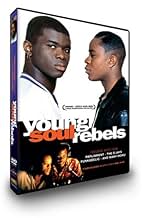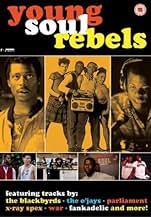Ajouter une intrigue dans votre langueTwo disc jockeys have a friend's murder to solve in the fringe-group melting pot of 1977 London.Two disc jockeys have a friend's murder to solve in the fringe-group melting pot of 1977 London.Two disc jockeys have a friend's murder to solve in the fringe-group melting pot of 1977 London.
- Réalisation
- Scénario
- Casting principal
- Récompenses
- 1 victoire au total
Eamonn Walker
- Carlton
- (as Eamon Walker)
Avis à la une
firstly this film has some mistakes in it,i was a soul girl back int he day,punks and soul boys weren't pally,but not enemies either,the didn't go to the same clubs,the fashion is correct but the music is out of time ,some of the music came out maybe up to 2 years later,that apart it does pick up the atmosphere of the day and the vibe and is at least acknowledging the soul scene,and the cult of soul boys and girls ,a major thing,but very unknown which is odd,i guess the write must have a bit of info of the movement,still as a fun film its OK and does bring a few
memories i think unless you were part of the scene you would find this
a bit dull,it is hollow ,but the clothes and dancing are all spot on,although gay guys did have there own disco clubs,again fairly underground as back then it wasn't as tolerated as it is,rightly so,now as so many other films have been made about punks and skinheads it god to see a movie reflecting a little known but extremely popular movement
memories i think unless you were part of the scene you would find this
a bit dull,it is hollow ,but the clothes and dancing are all spot on,although gay guys did have there own disco clubs,again fairly underground as back then it wasn't as tolerated as it is,rightly so,now as so many other films have been made about punks and skinheads it god to see a movie reflecting a little known but extremely popular movement
I saw this film shortly after it's release, and felt quite cheated. It's title and advertising gave me the impression that it would be about the black DJ sound systems and soul scene which was at it's height in England during the late '70s and early '80s. But this only took up a fraction of film time. Instead, I had to sit through a convoluted sub-plot featuring a murder mystery which appeared all of a sudden during the movie, a very gratuitous gay sex scene, and generally bad acting and direction. There were a few moments where the protagonists had brushes with the law, and I thought at last this film was going somewhere and would depict the racism of the justice system accurately. But this was not the case, and these scenes appeared to have been either badly written, or edited. And when one character deceides to carry out his own murder investigation, I found it laughable. I understand that no film can be 100% accurate when depicting an era or events around it, and that it should be entertaining to the viewer. But at least a good attempt should be made to get the basics right. For example, hardly any of the black male actors sported an afro hairstyle or wore flares, which would have been as common as a rainy day in London during 1977. Blacks mixing with Punks? I'm no sure about that. They would have considered a lot of Punks to be similar to the skinheads which carried out a lot of racist attacks at that time. Also another sex scene featuring Sophie Okenedo and Valentine Nonyela, was not handled well at all, and was certainly not as explicit as the previous gay sex scenes which says a lot about it's director. By trying to show that homosexuality in the black british community is opposed more than in the white, I feel is absolute nonsense. Homophobia has no colour preference, and being black, it's director Isaac Julien should know better really.
My review was written in May 1991 after a screening in the International Critics Week section of the Cannes Film Festival.
Too many ingredients are mixed in the stew of Isaac Julien's debut pic "Young Soul Rebels", an intermittently entertaining saga of countercultures in 1977 London.
Picture's London black milieu and murder mystery plotlines recall the classic Janet Green-scripted "Sapphire" over 30 years ago, but Julien keeps digressing from the main story to cover interesting yet tangential topics.
Theme, hammered away between musical or romantic interludes, concerns many forms of intolerance and stereotyping. Blacks and gays are the key protagonists, while ohter subgrps liek punks , soul music fans in Britain, half-castes (a theme echoing "Sapphire") and even Scottish nationalists are given attention.
Chris (Valentine Nonyela) and Caz (Mo Sesay) are two fledgling deejays broadcasting from the pirate radio station WEFUNK a form of black-oriented disco music. Their friend Terry James is murdered by a white man during a homosexual tryst in the park. Chris accidentally obtains an audio tape of the murder from TJ's boombox.
Chris halfheartedly tries to break into the mainstream via Metropolitan radio station, where he meets and romances a beautiful production assistant Tracy (Sophie Okonedo). Caz is revealed to be gay, and splits from his long-time partner to take up with a punk-styled white deejay Billibud (James Durr).
With Queen Elizabeth's Silver Jubilee as a backdrop (and target for frequent satire of the establishment) pic establishes its thriller credentials at the outset but is poorly paced. Director Julien's inclusion of homoserotic love scenes is no longer a cinematic novelty, yet their placement distracts from the main narrative (especially a lengthy bed scene of Caz and Billibud late in the film).
Styling of aggressively androgynous Valentine Nonyela in the central hetrerosexual role misleads rather than adds to the film's relentless attack on stereotypes.
Pic's most successful element is Nina Kellgren's high-contrast lighting that gives it a modern, futuristic look. Nostalgia content is covered by disco-era music ranging from Roy Ayers to War plus dancing to match. After the most obvious murder suspect is identified and in lame duck fashion disposed of, Julien adds a friendly ensemble dance scene for closure that doesn't ring true.
Young cast is attractive and enthusiastic and Frances Barber guests in a droll turn as Chirs' free =psirited white mom. Frequent male crotch (clothed) closeups a la Pasolini and the homosexual mileu should limit as well as define the film's potential audience. Some thick accents (French subtitles at Cannes definitely helped comprehension) are a drawback to Stateside acceptance.
Too many ingredients are mixed in the stew of Isaac Julien's debut pic "Young Soul Rebels", an intermittently entertaining saga of countercultures in 1977 London.
Picture's London black milieu and murder mystery plotlines recall the classic Janet Green-scripted "Sapphire" over 30 years ago, but Julien keeps digressing from the main story to cover interesting yet tangential topics.
Theme, hammered away between musical or romantic interludes, concerns many forms of intolerance and stereotyping. Blacks and gays are the key protagonists, while ohter subgrps liek punks , soul music fans in Britain, half-castes (a theme echoing "Sapphire") and even Scottish nationalists are given attention.
Chris (Valentine Nonyela) and Caz (Mo Sesay) are two fledgling deejays broadcasting from the pirate radio station WEFUNK a form of black-oriented disco music. Their friend Terry James is murdered by a white man during a homosexual tryst in the park. Chris accidentally obtains an audio tape of the murder from TJ's boombox.
Chris halfheartedly tries to break into the mainstream via Metropolitan radio station, where he meets and romances a beautiful production assistant Tracy (Sophie Okonedo). Caz is revealed to be gay, and splits from his long-time partner to take up with a punk-styled white deejay Billibud (James Durr).
With Queen Elizabeth's Silver Jubilee as a backdrop (and target for frequent satire of the establishment) pic establishes its thriller credentials at the outset but is poorly paced. Director Julien's inclusion of homoserotic love scenes is no longer a cinematic novelty, yet their placement distracts from the main narrative (especially a lengthy bed scene of Caz and Billibud late in the film).
Styling of aggressively androgynous Valentine Nonyela in the central hetrerosexual role misleads rather than adds to the film's relentless attack on stereotypes.
Pic's most successful element is Nina Kellgren's high-contrast lighting that gives it a modern, futuristic look. Nostalgia content is covered by disco-era music ranging from Roy Ayers to War plus dancing to match. After the most obvious murder suspect is identified and in lame duck fashion disposed of, Julien adds a friendly ensemble dance scene for closure that doesn't ring true.
Young cast is attractive and enthusiastic and Frances Barber guests in a droll turn as Chirs' free =psirited white mom. Frequent male crotch (clothed) closeups a la Pasolini and the homosexual mileu should limit as well as define the film's potential audience. Some thick accents (French subtitles at Cannes definitely helped comprehension) are a drawback to Stateside acceptance.
I'm afraid that this is a bit all over the place. In attempting to deal with multiple issues simultaneously it ends up doing justice to none of them well. A man is killed while cruising for gay sex in a local park and the subsequent investigation tries to deal with racism, sexism and homophobia amongst both the local community and the police. At times it is a love story - platonic and sexual between friends and lovers but the lines are blurred and the conflict seems largely manufactured. The performances are clunky and the script likewise. Sorry, but too much of a hutch-potch for me to make much sense of.
Been a long time since I saw this movie, but whenever I think of it, or even just hear that song from the soundtrack, I feel all happy and <ahem> gay. Funny thing is, I went back to see what I'd noted about it at the time (1991), and apparently I'd only considered it a so-so film!
So, yes, perhaps the story line was a bit flimsy, perhaps all of the movie didnt amount to a whole much ... but if the memory of it still makes me smile after ten years, it must've been a lot better than I'd originally realised! ;-)
So, yes, perhaps the story line was a bit flimsy, perhaps all of the movie didnt amount to a whole much ... but if the memory of it still makes me smile after ten years, it must've been a lot better than I'd originally realised! ;-)
Le saviez-vous
- AnecdotesThe film takes place in 1977.
- GaffesThe two punk bands GBH and Conflict weren't around in 1977.
- ConnexionsFeatured in Queerama (2017)
- Bandes originalesP. Funk Wants To Get Funked Up
Performed by Parliament
Licensed Courtesy of Casablanca Records Inc/Polygram Records Inc (New York)
Meilleurs choix
Connectez-vous pour évaluer et suivre la liste de favoris afin de recevoir des recommandations personnalisées
- How long is Young Soul Rebels?Alimenté par Alexa
Détails
Box-office
- Montant brut aux États-Unis et au Canada
- 225 664 $US
- Week-end de sortie aux États-Unis et au Canada
- 2 609 $US
- 24 nov. 1991
- Montant brut mondial
- 225 664 $US
Contribuer à cette page
Suggérer une modification ou ajouter du contenu manquant




























